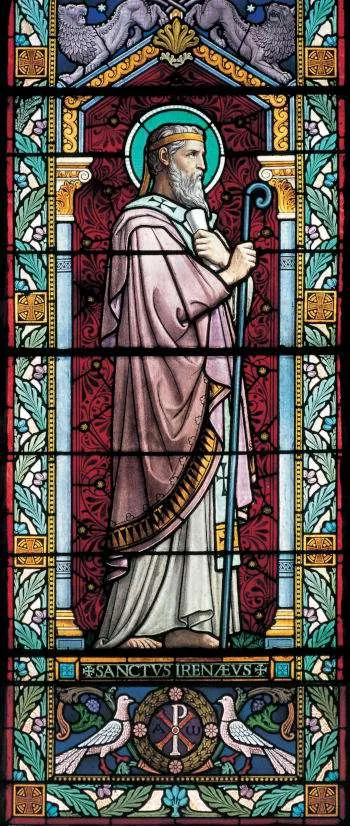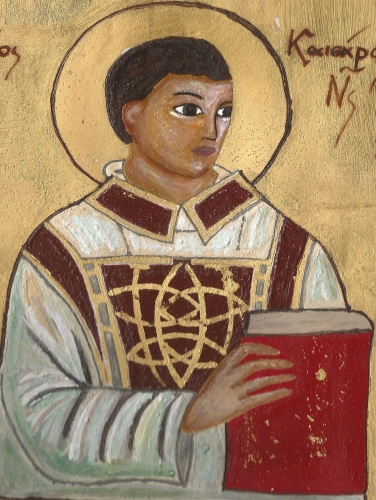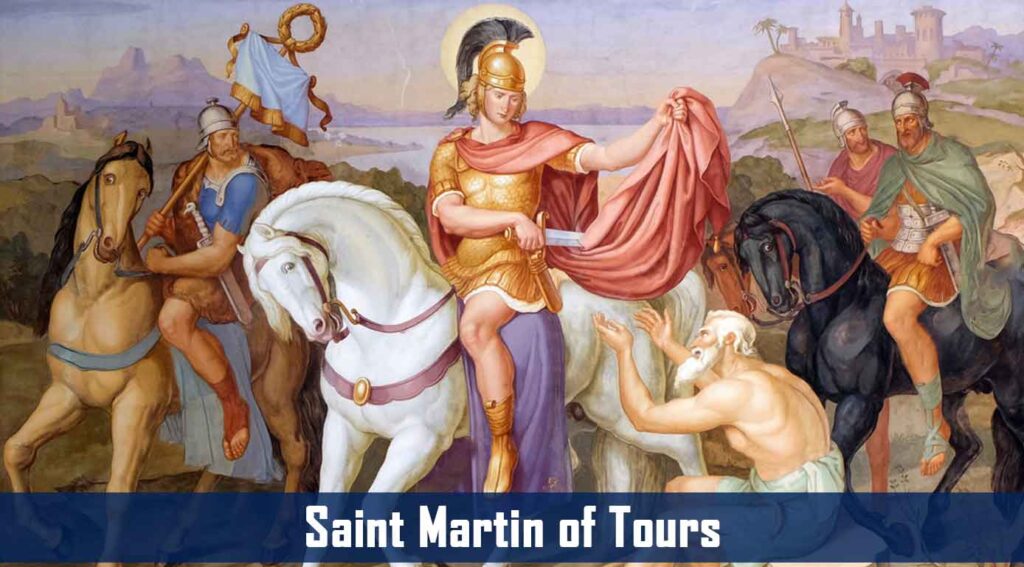c. 135–c. 202; Patron Saint of those who work for the unity of the Eastern and Western Churches; Invoked against Christological heresies, and by apologists and catechists; Pre-Congregation canonization; Declared a Doctor of the Church (Doctor of Unity) by Pope Francis in 2022
After Pentecost, the Apostles preached the Gospel and established the Church in numerous cities. Saint John the Apostle is believed to have preached in Ephesus, modern-day Turkey. It was there that Saint Polycarp learned from him about Christ, was ordained a bishop, and was sent to the town of Smyrna, just fifty miles north, to govern the Church for approximately sixty-five years. In Smyrna, a young man named Irenaeus, raised in a Christian family, became Polycarp’s disciple, learning more about the faith from this disciple of the Apostle John. After his ordination as a priest, Irenaeus ministered in modern-day Lyon, France, under Bishop Pothinus.
Around the year 177, the Christian community of Lyon sent Irenaeus to Rome to assist the pope with a theological dispute over a heretical teaching. The teaching, later referred to as Montanism, claimed that certain individuals possessed superior prophetic insights directly inspired by the Holy Spirit. This mission attests to the respect Irenaeus commanded among the Christians of Lyon and his grasp of vital theological concepts. Providentially, the mission to Rome likely spared Irenaeus’s life. While Irenaeus was in Rome, a severe persecution of the Church broke out in Lyon and roughly fifty Christians were martyred, among them Bishop Pothinus. Upon returning to Lyon, Irenaeus was chosen as the next bishop.
As Bishop of Lyon, Irenaeus was a faithful pastor with a profound understanding of the Gospel as communicated from Jesus through the Apostles, and he articulated the faith with great clarity. He was energetic in his evangelization efforts throughout the region, sending missionaries to convert the many citizens who adhered to pagan beliefs. As the faith began to spread, errors concerning the faith started to emerge alongside Apostolic teachings. Although many of the early heretics might have had good intentions, they were not rooted in the pure faith and required correction to ensure the Church stayed on the straight and narrow path towards salvation. Irenaeus was one of the most influential figures in the early Church to guide the newly formed Christian communities down that safe road. He is especially known for two of his surviving writings: “Against Heresies” and “Demonstration of the Apostolic Teaching.” These two works constitute what is considered the very first catechism of the Catholic faith.
The most prevalent heresy in the early Church was what is now known as Gnosticism. Gnosticism is a broad term for many smaller deviations, all sharing similar premises. Generally, Gnosticism claimed that true knowledge was beyond the grasp of the ordinary person, and that the true intellectuals were privileged to possess a secret knowledge or insight necessary for eternal salvation. This secret knowledge was related to human nature, God, and the universe.
Irenaeus begins his defense of the faith by highlighting the “absurd ideas” of the heretical group called the Valentinians: “They maintain, then, that in the invisible and ineffable heights above there exists a certain perfect, pre-existent Æon, whom they call Proarche, Propator, and Bythus, and describe as being invisible and incomprehensible. Eternal and unbegotten, he remained throughout innumerable cycles of ages in profound serenity and quiescence.” Irenaeus went on to describe the Valentinians’ fantasy-like view that an offspring of one of these Æons, named the Demiurge, foolishly created the universe. The Valentinians identified this Demiurge as the evil god of the Old Testament. Jesus and His Father, by contrast, were good and were attempting to rescue humanity from their physical natures by helping them to obtain full knowledge of this spiritual history so that the enlightened ones could then enter into a purely spiritual realm, shedding the evil of the material world. After exposing the errors of the Valentinians, Irenaeus went on to expose the errors of others who fell into similar Gnostic camps.
Irenaeus’ approach was first to explain the errors by demonstrating the absurdity of the complex and confusing views of the Gnostics, that they employed poor reasoning in their beliefs, borrowed their ideas from other popular stories, and rejected the Rule of Faith handed down through Tradition from the Apostles. He then took a more positive approach by clearly articulating that the life, sufferings, death, and resurrection of Christ were central to human salvation, and that, in the humanity of Christ, we are all saved and made one with Him, being reunited with the Father. This was achieved by carefully expounding on the Scriptures, both the Old and the New Testaments, and showing that the faith handed down from Jesus to the Apostles to the wider Church was comprehensible by all and easily embraced with simplicity and faith.
In a General Audience, Pope Benedict XVI explained it this way: “Irenaeus tells us, there is no secret doctrine concealed in the Church’s common Creed. There is no superior Christianity for intellectuals. The faith publicly confessed by the Church is the common faith of all. This faith alone is apostolic, it is handed down from the Apostles, that is, from Jesus and from God” (March 28, 2007). Thus, this so-called special “knowledge” that the Gnostics claimed to possess was purely fabricated by them, as it did not originate from the Apostles.
It’s hard to overestimate the importance of Irenaeus’ teachings for two main reasons. First, he aided the early Church in navigating through the initial confusion it encountered as new and erroneous ideas emerged. Second, his writings were among the first comprehensive catechetical instructions of the early Church, and those writings enabled numerous others who came after him to build upon what he had taught. Jesus promised the Apostles that the Holy Spirit would lead the Church into all truth. This happens when holy men and women listen to all that is handed down to them, remain faithful to that sacred Tradition, build upon it, and pass it on to others to develop it further. The Gospels were the first and most important foundation for this ongoing process. Irenaeus’ writings came shortly afterwards and remain an important foundation today. In fact, even in the most recent Church council, the Second Vatican Council, Irenaeus was one of the most quoted of the Church Fathers, showing an unbroken succession of faith from the early Church until today. Interestingly, it was not until 2022 that Saint Irenaeus was declared a Doctor of the Church under the title “Doctor of Unity.” This unique title particularly points Catholics of the East and West to the foundations of faith that we share with every other Apostolic Church, such as the Orthodox, with whom reunification is continuously sought.
As we honor this great Doctor of the Church, ponder the fact that your own faith has been believed and lived since the time of Christ. At times, our modern world seeks to undermine this ancient faith by labeling it as “old-fashioned” or “out-of-date.” Nothing could be further from the truth. The Truth that was revealed by Christ and His Apostles is as true today as it was at that time. Seek to immerse yourself in that unchanging yet ever-deepening deposit of faith, and you will discover that your family of faith includes all Christians of every era, making up the one Body of Christ.
Source: https://mycatholic.life/saints/saints-of-the-liturgical-year/june-28—saint-irenaeus-bishop-and-martyr/








